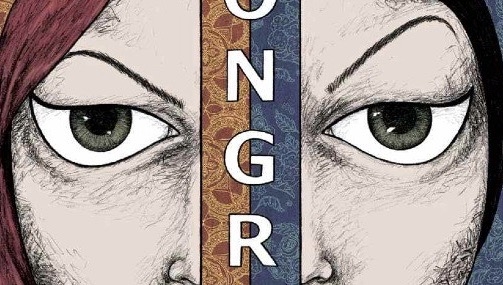We are currently living in a time where people who have been constantly othered feel more freedom to express their truths and know that others will be listening. Sayra Begum’s intensely personal graphic novel, Mongrel, examines the life of a young Muslim woman coming of age in modern Great Britain. Her path is doubly difficult, because her father is a white British Muslim convert while her mother is a traditional Bangladeshi woman, so she has ties to two worlds but cannot fully claim either as her heritage.
Sayra starts her autobiographical story at the end, with Shuna’s wedding to a white British non-Muslim. Her parents are not present, because they don’t approve of her chosen spouse and they’ve cut her off from her younger brother, as well. Through episodic chapters that mix realism and dreamlike memories, Sayra reveals a childhood of struggling to be Muslim enough for her extremely traditional parents and a desire to experience childhood like her classmates, even other young Muslims. Her mother also focused on making her mixed ethnicity children perfect Muslim ideals, which created insecurities in Shuna about whether she could ever be good enough. Ultimately, her mother’s expectations push both Shuna and her older brother out of the family when they make choices contrary to her values.
As a white woman (I’ve done three genetics tests, and my family tree mostly sprouts out of Northern England.) with fairly progressive and extremely supportive parents, I can’t say I relate to Shuna’s experiences, but Mongrel opened me to another person’s unique life journey. Finding your identity is a complex part of developing, and I appreciated Sayra’s honesty in exploring the difficulties of knowing which parts of family culture take precedence over external influences. I’m a huge fan of memoirs, because they help the authors process issues that many readers may relate to, but Mongrel plays an even deeper role by revealing the painful reality of a young woman who longs for both parental love and societal acceptance. Representation matters, and I’m sure many young Muslim women in Western Europe, Canada, and the US will see themselves in aspects of Shuna’s story. Knowing you are not the only one helps, even if not everything in this graphic novel applies to any one reader’s life.
Sayra created all of the pencil drawings used in Mongrel, a gift from her father who encouraged her artistic pursuits. The black-and-white pages with detailed pencil work drew me into the complex web of the story, and while the style isn’t photorealistic, it is highly unique which fits the narrative. The sheer amount of penciling in a single panel is intimidating!
Sayra Begum’s Mongrel is one of those graphic novels that will become utilized in classrooms across the world to help open some students to unfamiliar worlds and teach others that they are seen and that they are not the only ones torn between cultural expectations. I still ponder aspects of Shuna’s life weeks after finishing my read, and I have to classify this as a must-read for anyone wanting insight into life as a young Muslim in a Western society.
4.5 Meticulously Drawn Fabric Patterns out of 5
This graphic novel releases in the UK on August 25, 2020, but it will not be available from Amazon USA until December 2020.
Creative Team: Sayra Begum (illustrator and writer)
Publisher: Knockabout Press
Click here to purchase.

